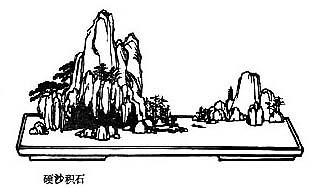孫
子
兵
法
Sun Zi 
 – L'Art de la guerre
– L'Art de la guerre
La stratégie chinoise ou comment s'informer, estimer, diviser, détourner, tromper, et vaincre « sans coup férir ». Tr. Amiot (fr) et Giles (en).
De la topologie
Sunzi X. 6.
Recherchez un lieu dans lequel il y aurait une montagne assez haute pour vous défendre de toute surprise, où l'on pourrait arriver et d'où l'on pourrait sortir par plusieurs chemins qui vous seraient parfaitement connus, où les vivres seraient en abondance, où les eaux ne sauraient manquer, où l'air serait salubre et le terrain assez uni ; un tel lieu doit faire l'objet de vos plus ardentes recherches. Mais soit que vous vouliez vous emparer de quelque campement avantageux, soit que vous cherchiez à éviter des lieux dangereux ou peu commodes, usez d'une extrême diligence, persuadé que l'ennemi a le même objet que vous. Si votre rival vous a prévenu, et qu'il ait pris son camp dans le lieu où vous auriez dû prendre le vôtre, c'est-à-dire dans le lieu le plus avantageux, ne vous amusez point à vouloir l'en déloger en employant les stratagèmes communs ; vous travailleriez inutilement.
Amiot
With regard to PRECIPITOUS HEIGHTS, if you are beforehand with your adversary, you should occupy the raised and sunny spots, and there wait for him to come up.1
If the enemy has occupied them before you, do not follow him, but retreat and try to entice him away.2
Giles X.10,11.

L'Art de la guerre – Sun Zi X. 6. – Chinois on/off – Français/English
Alias Sun Tzu, Sun Wu, Sun Tse, Sunzi Bingfa, Souen Tseu, Souen Wou, 孫武.
Le Canon des Poèmes, Les Entretiens, La Grande Étude, Le Juste Milieu, Les Trois Caractères, Le Livre des Mutations, De la Voie et la Vertu, 300 poèmes Tang, L'Art de la guerre, Trente-six stratagèmes
Bienvenue, aide, notes, introduction, table.
Index – Contact – Haut de page
